
2018 marks the eighth year of the Syria crisis and Lebanon remains host to approximately 1.5 million Syrian refugees and asylum seekers – in addition to nearly 20,000 from other countries, e.g. Iraq and Sudan.1 The evaluation of UNHCR’s interventions to respond to, mitigate and prevent SGBV affecting the refugee population in Lebanon during 2016–18 aims to document results, lessons, challenges and practices in UNHCR SGBV approaches. This will inform future strategies and decision-making in Lebanon and generate lessons for other comparable contexts. The evaluation addresses five key questions of relevance, coverage, coherence, effectiveness and lessons of the UNHCR SGBV approach in Lebanon.
The evaluation process, carried over July-October 2018 was undertaken by a three person team who gathered data for two weeks in Lebanon in August 2018 and carried out further desk analysis. The key methods used included: document review; quantitative analysis of secondary data; 105 key informant interviews – including with UNHCR staff, members of the Ministry of Social Affairs (MoSA) and UNHCR partners; 33 focus group discussions with community members and other key stakeholder groups; two surveys of SGBV task force members and of UNHCR staff with SGBV responsibilities; mapping process on distribution of services; and analysis of financial, human resource and programme data. The evaluation directly involved 285 participants. Assessments of performance were made in relation to judgement criteria for each evaluation question developed as part of the evaluation matrix. Recommendations and lessons were developed inconsultation with UNHCR through an in-country workshop to discuss emerging findings with UNHCR staff and and meeting with senior management team.